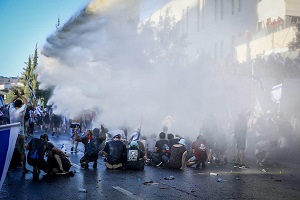 Protestujący przeciw reformie sądownictwa biją się z policją, która utrudnia im blokowanie Knesetu, 24 lipca 2023 (Zdjęcie: Noam Revkin Fenton/Flash90.)
Protestujący przeciw reformie sądownictwa biją się z policją, która utrudnia im blokowanie Knesetu, 24 lipca 2023 (Zdjęcie: Noam Revkin Fenton/Flash90.)
 W jakiej sprawie płonie Izrael?
W jakiej sprawie płonie Izrael?
Andrzej Koraszewski
Coraz bardziej ponure wiadomości z Izraela. Otoczony śmiertelnymi wrogami kraj, którego społeczeństwo jest rozdarte podziałami i w amoku nienawiści gotowe jest zniszczyć swój kraj.
Antysemicki świat zaciera ręce i dolewa oliwy do ognia, funduje mundurki protestującym, dopłaca do transportu, szczuje na arenie politycznej. Wielu przypomina dziś wydarzenia sprzed dwóch tysięcy lat, kiedy ostateczna klęska stała się faktem nie tylko z powodu przemożnych sił zewnętrznych, ale i z powodu niwelujących zdolności obronne podziałów wewnętrznych. (Wiele narodów włącznie z Polską, miało podobne doświadczenia, chociaż na ogół nie aż tak tragiczne w skutkach.) Arabscy komentatorzy już zapewniają, że jesteśmy świadkami końca istnienia „syjonistycznego tworu”.
Dwóch znakomitych prawników amerykańskich opublikowało w prawicowej gazecie (no bo w jakiej mogli opublikować?), artykuł, który zaczynają od stwierdzenia, że prezydent Stanów Zjednoczonych stanowczo pogroził palcem Izraelowi i tupnął nogą, że Izrael bezwarunkowo musi, bo jeśli nie, to ten prezydent będzie ostatnim amerykańskim prezydentem demokratów, który jest proizraelski.
Dziwią się profesor Richard A. Epstein wraz z profesorem Maxem Raskinem, że czegoś im brakuje w tym groźnym ostrzeżeniu ze strony największego mocarstwa świata pod adresem najmniejszego mocarstwa świata. A brakowało dwóm amerykańskim prawnikom jakiejś wzmianki o tym, o co w dalekim Izraelu toczy się spór. Bowiem skromnym zdaniem tych dwóch nauczycieli przyszłych amerykańskich prawników, te reformy w żydowskim państwie nie są wezwaniem do rewolucji, ale całkiem rozsądną odpowiedzią na izraelski system sądowniczy, który ma większą władzę niż jakikolwiek inny system sądowniczy w świecie zachodnim.
Rzekomą przyczyną ostatnich protestów w Izraelu było przegłosowanie przez parlament ustawy ograniczającej możliwości stosowana przez Sąd Najwyższy zasady „widzi mi się”, (zwanej „zasadą rozsądności”), do oceny nominacji politycznych rządu i decyzji wykonawczych. Ta zasada daje zdaniem tych dwóch prawników sądowi władzę obalenia polityki wybranego rządu na podstawie własnych sympatii bądź antypatii i jest sprzeczna z całą zachodnią praktyką sądowniczą, która oczekuje od władzy sądowniczej nadzoru nad zgodnością działań obywateli i polityków z ustanowionym prawem, a nie funkcjonowania na zasadzie „państwo to ja”.
Jak na ironię, amerykański prezydent nie tylko nie zauważył, o co chodzi w proponowanej reformie, ale nie wzywa opozycji do negocjacji, tylko wzywa rząd izraelski do „konsensusu”, co w efekcie jest próbą wymuszenia trwania przy rozwiązaniach paraliżujących działanie władzy wykonawczej, czego oczywiście nigdy by nie zaakceptował w odniesieniu do amerykańskiej polityki wewnętrznej.
Jak stwierdzają ci dwaj amerykańscy prawnicy, izraelscy sędziowie uzurpowali sobie prawo stanowienia prawa, podczas gdy europejska i amerykańska prawnicza tradycja ogranicza sądy do interpretacji praw stanowionych przez gałąź ustawodawczą. Ustawiczne interwencje Sądu Najwyższego w działania władz wykonawczych Izraela paraliżują państwo i prowadzą do chaosu. (W Polsce zasada liberum veto powodowała paraliż władzy ustawodawczej, który walnie przyczynił się do upadku Rzeczpospolitej.)
Żeby było ciekawiej, amerykańscy postępowcy są przeciwnikami wtrącania się sądów do polityki i ostro krytykują sądy uchylające ustawy sprzeczne z prawem.
Autorzy artykułu zwracają uwagę, że przywódcy izraelskich protestów nigdy nie wyjaśniają, dlaczego Izrael musi pozostać krajem z praktyką sądowniczą całkowicie sprzeczną z zachodnią tradycją systemu parlamentarnego. Nawołują do gwałtownych protestów, których celem jest zakłócenie działania państwa i odmawiają parlamentarnej dyskusji o kształcie proponowanych reform. Efektem jest całkowite zagłuszenie każdej próby merytorycznej dyskusji oraz świadome dążenie do osłabienia bezpieczeństwa gospodarczego i militarnego. Ta opozycja, jak czytamy w tym artykule, stawia rząd w sytuacji właściciela sklepu, zmuszając do wyboru, czy zapłacić gangsterom rujnujący haracz, czy ryzykować dewastację sklepu.
Rzadko wskazuje się na fakt, że ten całkowity brak merytorycznej dyskusji, wynika z znacznym stopniu z tego, iż protesty przeciw reformie są narzędziem obrony uprzywilejowanej pozycji Żydów aszkenazyjskich, których pozycja słabnie. Izrael staje się mniej biały, a przybysze z krajów arabskich okrzepli, zdobyli wykształcenie i domagają się swojego miejsca na arenie politycznej i gospodarczej. Amerykańscy postępowcy z prezydentem na czele walczą o różnorodność, ale jeśli można zaszkodzić Izraelowi, to mogą również wspierać biały przywilej i absolutnie nie zamierzają popierać tych wartości, które lansują u siebie w domu. Jak piszą Epstein i Raskin dziś Ameryka popiera WASP (White Ashkenazic Supporters of Peace, czyli Białych Aszkenazyjskich Zwolenników Pokoju).
Trudno o wątpliwości, że te protesty uderzają w gospodarkę i zachęcają zewnętrznych wrogów do ataku. Dobrą wiadomością jest fakt, że wezwania do odmowy służby przez rezerwistów słabo działają, a na wezwanie do strajku lekarzy wielu rezygnuje z członkostwa w związku zawodowym, ale przeraża samobójcza walka o przywileje, która z każdym dniem przeradza się w bardziej barbarzyńskie działania izraelskiej ulicy.
wandalizm, nękanie urzędników publicznych, zamykanie głównych środków transportu publicznego, zakłócanie obrad Knesetu i groźby niesubordynacji wojskowej nie powinny być pierwszą reakcją na uzasadnioną debatę publiczną. Krytykując te bardzo wyważone reformy, takie jak uniemożliwianie sędziom mianowania własnych następców, protestujący angażują się w zachowania, które potępiliby, gdyby stali po drugiej stronie barykady.
Dziedzice tych, którzy budowali Izrael, bawiąc się zapałkami w prochowni, mogą dziś zniszczyć wszystko, co zbudowały poprzednie pokolenia.
Część moich znajomych zapewnia mnie, że ich izraelscy krewni i znajomi wszyscy biorą udział w protestach i z pewnością wiedzą co robią. Na pytania o meritum sporu odpowiadają jak amerykański prezydent, wykazując ten sam poziom orientacji.
Zawartość publikowanych artykułów i materiałów nie reprezentuje poglądów ani opinii Reunion’68,
ani też webmastera Blogu Reunion’68, chyba ze jest to wyraźnie zaznaczone.
Twoje uwagi, linki, własne artykuły lub wiadomości prześlij na adres:
webmaster@reunion68.com





